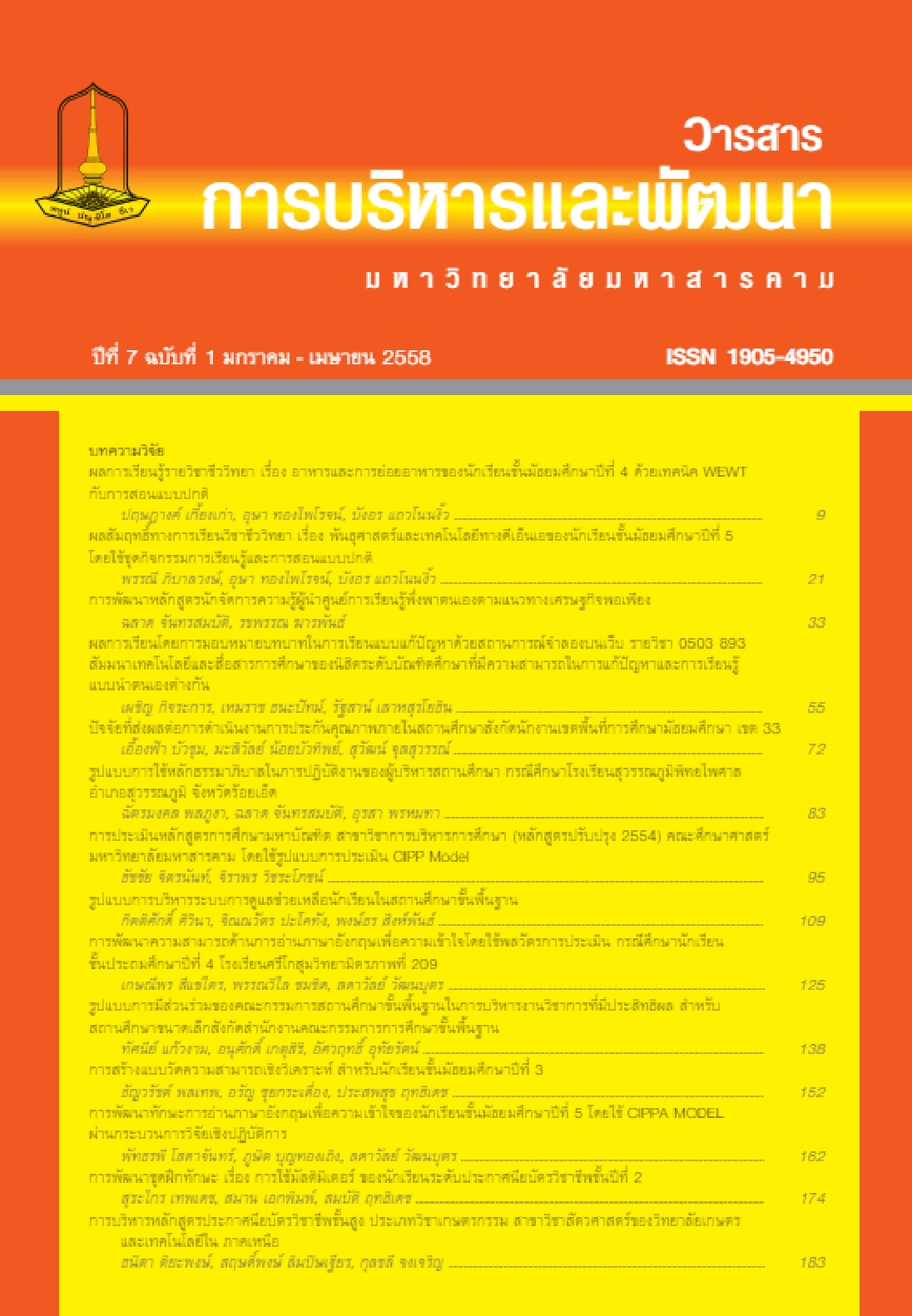The Development Reading English Comprehensive skills of Mattayomsuksa 5 Students by Using CIPPA MODEL through Action Research Process
Main Article Content
Abstract
The purposes of the research were to 1) develop learning activities by using CIPPA MODEL through action research in order to develop English reading comprehensive as the criteria 80/80. 2) compare English reading comprehensive skills of Mattayomsuksa 5 students after using CIPPA MODEL that the author had developed. 3) study the value of effective index of studying by using CIPPA MODEL that the author had developed. 4) study the satisfaction of Mattayomsuksa 5 students after studying by using CIPPA MODEL that the author had developed. The tools used in the research were 1) CIPPA MODEL lesson plans ; 4 plans, 3 periods in each plan and 55 minutes in a period. 2) The pre-test and post-test for reading English Comprehensive skills ; 4 choices for an item and 10 items in each circle. 3) The satisfaction questionnaires for reading English comprehension by using CIPPA MODEL, it was Likert’s 5-level rating scales ; 20 items. 4) The reading English comprehensive post-test ; 4 choices, 30 items and 5) The reflection form of learning process. The sample group were 36 Mattayomsuksa 5 students of Kosumwittayasan School, Kosumpisai District, MahaSarakham Province in 1st semester, 2012 by using Purposive Sampling Technique. The data was analyzed by using percentage, mean, S.D. and statistics hypothesis test by using t-test (Dependent Samples).
The results of the research were found that:
1. Learning activities by using CIPPA MODEL to develop reading English comprehensive skills of Mattayomsuksa 5 students was effective (E1/E2) as 79.47/82.78 met the criteria 80/80 which the author set. 2. The reading English comprehensive skills achievement post-test after using CIPPA MODEL o fMattayomsuksa 5 students was higher than pre-test significantly at the statistics level 0.01. 3. The learning activities by using CIPPA MODEL to develop reading English comprehensive skills ; the Effective Index (E.I.) was .60. It meant the learning by using CIPPA MODEL made the students progress in learning 60%. 4. The students satisfied with CIPPA MODEL learning that the author had developed in high level ( x̅ =4.08, S.D.=0.14). The highest satisfaction scores were learning medias ( x̅ =4.18, S.D.=0.11) and the lowest satisfaction scores were the texts ( x̅ =3.94, S.D.=0.04).
Downloads
Article Details
References
Department of Curriculum and Instruction Development. (2008). Basic Education Core Curriculum of Foreign Languages 2008. Bangkok: Department of Curriculum and Instruction Development, Ministry of Education.
Jiranan Boonruan. (2001). Effects of Employing CIPPA Instructional Model Emphasizing Language Learning Process on Learning Achievement and Attitude towards Thai Language Learning of Prathom Suksa 3 Students. Master of Education in Elementary Education, Chulalongkorn University.
Kongsak Thatthong. (1999). Applied Classroom Action Research. Journal pp. 2, 10: October, 1999.
National Institute of Educational Testing Service. (2010). Ordinary National Educational Test Report 2010. Page 103-104, June.
Secondary Educational Service Area Office 26. (2010). National Test Results 2010. Kosumpisai: Maha Sarakham
Somsri Thammasarnsophon. (1995). A Comparison of English Writing Ability of Mathayom Suksa Six Students Learning through Process-Oriented Approach and Product-Oriented Approach. Information Research 15, 13-14: January-February.
Tapanee Wichairam. (2004). Development of Learning Plans to Practice Mathematics Problem Solving in Fraction for Prathom Suksa 4 by using the Cooperative Learning. Independent Study in Curriculum and Instruction. Maha Sarakham: Maha Sarakham University.
Waraporn Attamsoontorn. (2003). Effects of Semantic Mapping Activities on English Reading Comprehension of Prathom Suksa 6 Students. Independent Study in Elementary Education. Chiang Mai: Graduate School Chiang Mai University.


